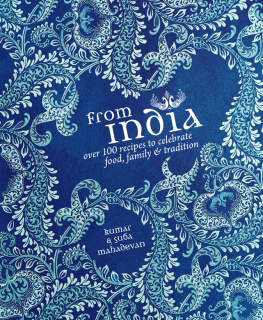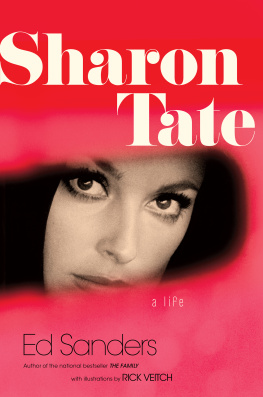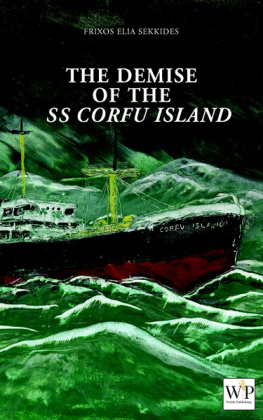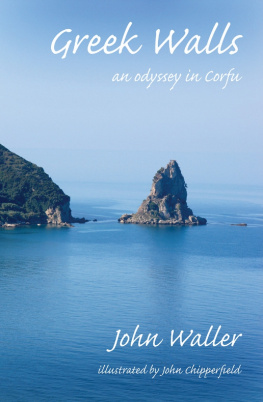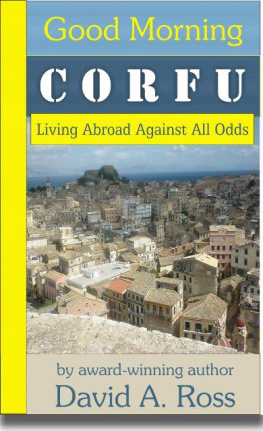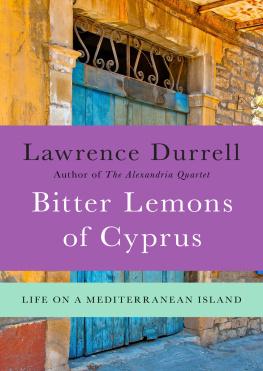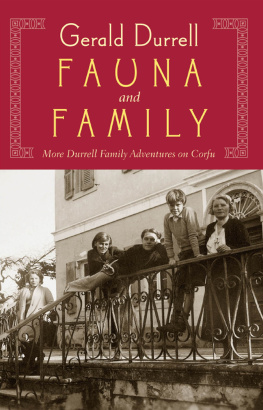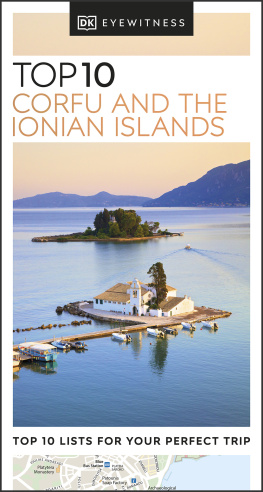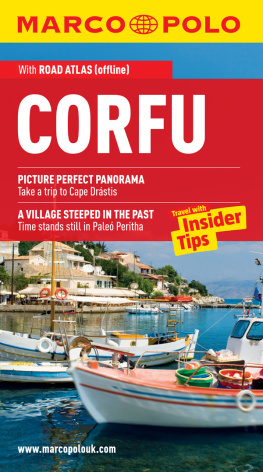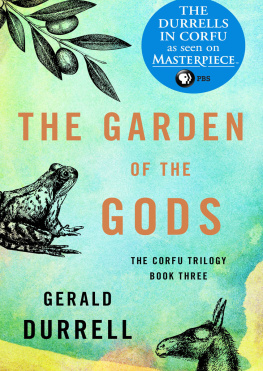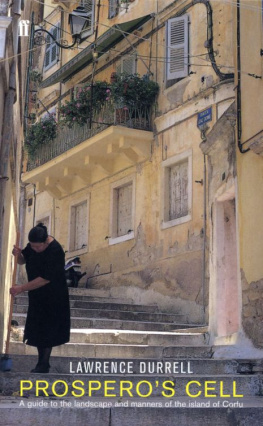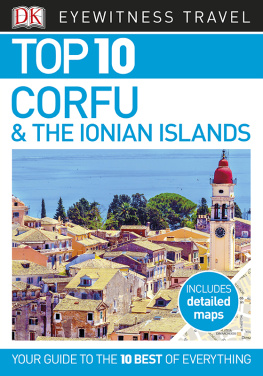
F OR W ENDY
P RELUDE
November 1982
T HE STORM REACHED THE ISLAND just after nightfall, a monstrous anvil of cloud that came twisting down the Adriatic, lit from within by red and white lightning. For a moment, it towered over the hills that surrounded our high mountain valley, while the tall cypress trees moaned and swayed in panic. A sudden gust of wind sucked the dried brown leaves from the grapevine above the patio. Panes of glass buzzed in the window frame, shutters swung hysterically on their hinges. As the first great peal of thunder shook the house, the electricity gave out. Wendy and I had been doing our accounts in the privacy of the bedroom. We sat motionless in the sudden darkness and watched the glowing red bar of the tiny electric heater fade to black.
Feeling my way along the walls of the corridor, through the parlour with its red plush, Sunday-best sofas, I reached the warmth of the kitchen. Our friend Kostantes was bent over the wood stove, loading another log. Woo woo woo, Dzimi! he laughed, his gold tooth flashing piratically in the candlelight. I pointed at the candle on the table, trying to make him understand we too wanted light. He limped across to the old dresser beside the fridge and started to rummage around in a drawer. Ol, Dzimi! he called triumphantly, brandishing a half-burned stub. He lit it in the other candles flame, dripped some wax into a small glass tumbler and stuck the little stump down. Oreia? he asked, glancing up at me coyly. Oreia was one of the half-dozen Greek words I knew. It meant beautiful, and Kostantes and I used it with reckless abandon in our long, mimetic conversations. Oreia, I agreed with genuine enthusiasm, and he chuckled and patted my back. O Dzimi!
Back to the bedroom, shielding the precious light. Wendys eyes were wide with excitement at the imminent adventure. She loved storms. We struggled into our overcoats and made our way to the kitchen, where Kostantes was waiting to shake our hands and wish us luck. With a flourish, he opened the door onto the street. The wind blew the candles out.
By now, the night was as black as fury, the air thick with flying matter. Something that might have been a cardboard box banged against my legs. Farther up the street, a window glowed faintly where Philip had lit his emergency hurricane lamps. The owner of the village kafeneiona bar that also sold coffee, cigarettes and chocolatePhilip spoke pretty good English and had agreed to act as translator for us tonight.
What? shouted Wendy.
I said, this is the wind the banshees ride, bringing madness and woe!
Our lives had been just as chaotic for the last three monthsthe death of my father in England, the deaths of my two grandmothers, my marriage to Wendy, our decision to leave our penurious lives in Toronto and move back to Europe, the delightful, terrifying, totally unexpected discovery that Wendy had become pregnant on our wedding night. And now we were about to take the final step off the clifftop of common sense. We were going to buy a house on the edge of a remote mountain village on a Greek island, a 150-year-old ruin with nothing to recommend it but stone walls that were three feet thick and the most beautiful view in the world.
We knew the owner, Panayotis, only by sighta farmer and sometime builder with a thick, drooping grey moustache and a docile, dignified manner. The house where he lived stood almost across the road from the kafeneion but we might have missed it if we hadnt seen Panayotiss flashlight bobbing up and down. He was out on his porch in the storm, urgently waving us in. I felt Wendys hand on my arm, her warm breath against my ear.
Remember, she whispered. We have to beat him down to ten thousand pounds. Two million drachmas. No more!
Too nervous to manage much of a smile, Panayotis led us into the front parlour and gestured that we might like to sit down on the sofa. Then he pointed at the useless electric light in the ceiling and the paraffin lamp on the sideboard, its yellow flame casting melodramatic shadows around the room. He shook his head and murmured something in Greek. We nodded reassuringly, trying to show him we understood. Now his wife, Elpitha, appeared, tall, broad and haughty, carrying a tray of coffee, glasses of water and a small dish of preserved kumquats in heavy syrup. Doilies were spread on the polished coffee table, the treats carefully handed out. Elpitha shot her husband one emphatic glance and glided away into the kitchen.
Rain rattled against the shuttered windows. We sipped the thick, sweet coffee. Panayotis glanced at his watch and began to gnaw a fingernail. O Philippos, he said, spreading his hands with an expression of despair. At last, we felt a gust of cold air from the front door and heard a man stamping and cursing in the hallway. Panayotis hurried out. He was still talking as he followed Philip back into the parlour.
Fuckin hell, man! growled Philip cheerfully. Im thinkin this is fuckin crazy to be out in these weathers. Even my dog is staying home. Anyhow, lets do this business.
He turned to Panayotis and a long conversation ensued, our host talking quickly and intently, Philip frequently interrupting, raising his voice.
Okay, James, he said at last, muttering the words in his gravelly bass in case Panayotis, or Elpitha lurking behind the kitchen door, had suddenly learned to speak English. He wants to sell you that house. The one on the other side of the hill over Zervou ridge. The one which is having the two rooms upstairs and the one big room downstairs. And with it, also, the other small house which is just one room. And with it, also, the land. He turned to Panayotis. Posses elies?
Endeka elies, said Panayotis.
With eleven olive trees. Thats the house you want?
Yes!
But Philip paused for effect. He has some problems. He wants still to be using that path which is between the house and the small house for him and his family to pass by.
Absolutely. Their right-of-way. Thats fine.
Philip grunted in surprise.
And with him, his donkey will also pass by.
Sure!
And There are still some certain things, I can say, inside the house, that are belonging to him until he can take thems away.
What things?
Some almonds and some wools.
We smiled and nodded at Panayotis. No problem! Please ask Panayotis if he has decided on a price.
A brief conference. The silence from the kitchen was palpable.
He says one million two hundred thousand. In cash. In sterling pounds that he can turn around into drachmas when the rate is improving in May.
One million two hundred thousand?
Yes, man.
I looked at Wendy.
Okay.
Philip seemed slightly disappointed. He shrugged, leaned back in his chair and pulled a packet of cigarettes from his pocket. Panayotis stood up, suddenly relaxed and genial, almost giggling, shaking our hands. Elpitha entered, beaming with approval, and kissed Wendy on the cheeks. Outside, the storm raged on, though whether in fanfare or warning I really couldnt say.
And that was it. Days followed with lawyers, surveyors and notaries public, bank managers and vice-consuls, mornings going from office to office in Corfu Town, trudging through steady rain to spend hours in a dozen badly furnished anterooms. So many laborious wheels to set in motion, but they were mere details, ex post facto. The handshake with Panayotis had been the irrevocable moment. Then we were on the plane, flying back to England to close up our lives there, to sell my flat in South London and figure out how to bring our belongings to Greece. We sat in exhausted silence until the seat-belt sign went out. Wendy was looking at me.






